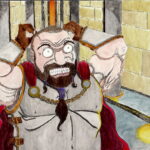You feel the need to use repetitive physical stimulation (stimming) for (IE)d4 rounds to manage your emotions. Stimming can manifest as hand flapping or finger movements, rocking, unusual posture, watching a repetitive movement, making or listening to a song or noise repeatedly, manipulating a fidget device, or mouthing inedible objects or your own appendages. Aside from drawing negative attention from those who don’t understand this behavior, inability to stim can lead to emotional dysregulation. When needing to stim, if unable, you must succeed on a DC 3 + (IE) Wisdom check to fight the urge each round, the DC increasing cumulatively by (IE) each round until you meet your stimming needs. Failure to resist the urge causes a −(IE) penalty on all ability checks until you meet your stimming needs.
At IE 4, stimming may be self-injurious, such as hand-biting (succeed on a DC 5 Constitution saving throw or develop Infection), eye-poking (succeed on a DC 5 Constitution saving throw or develop Infection. On a critical failure, develop Refractive Difference), or head-banging (1 bludgeoning damage every 1d4 rounds).
Real-world Examples
Autism, Sensory Processing Disorder, Rett Syndrome, Fragile X Syndrome, Prader-Willi Syndrome, Attention Deficit Hyperactivity Disorder, Tourette Syndrome, Schizophrenia, Fronto-Temporal Dementia, Alzheimer’s Dementia
Assistive Options
While stimming is normally harmless and in fact helpful, if it gets in the way of achieving your goals or is self-injurious, some helpful options may include attempting to avoid the causal stimulus, which is not always possible. You may also attempt proactively stimming if expecting a triggering situation, which reduces the length needed later by 1d4 rounds and gives a +1 bonus to the Constitution saving throw to resist. Wearing a helmet or other protective gear that still allows you to get the needed stimulation but reduces or eliminates the resulting injury may also be possible for self-injurious stimming. Fidget items and chewelry sometimes provide a safe alternative to some injurious movements.
